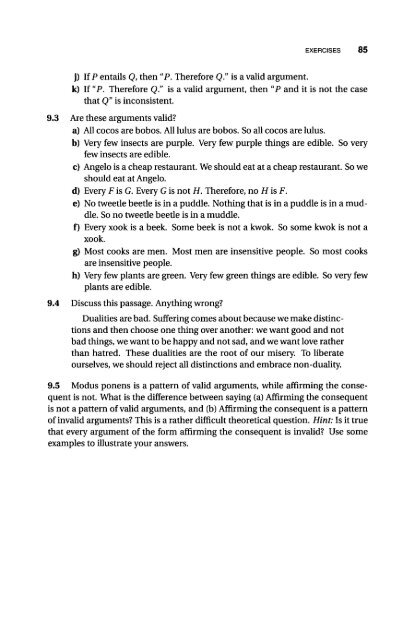- Page 2 and 3:
This page intentionally left blank
- Page 4 and 5:
This page intentionally left blank
- Page 6 and 7:
Copyright © 2011 by John Wiley & S
- Page 8 and 9:
This page intentionally left blank
- Page 10 and 11:
VIII CONTENTS 9 Valid and sound arg
- Page 12 and 13:
X PREFACE • This book has a compa
- Page 14 and 15:
2 INTRODUCTION Which is more import
- Page 16 and 17:
4 INTRODUCTION knowing the rules of
- Page 18 and 19:
6 INTRODUCTION 1. The first questio
- Page 20 and 21:
8 INTRODUCTION • Open-mindedness:
- Page 22 and 23:
This page intentionally left blank
- Page 24 and 25:
12 THINKING AND WRITING CLEARLY Con
- Page 26 and 27:
14 THINKING AND WRITING CLEARLY own
- Page 28 and 29:
16 THINKING AND WRITING CLEARLY •
- Page 30 and 31:
18 THINKING AND WRITING CLEARLY Tip
- Page 32 and 33:
20 THINKING AND WRITING CLEARLY g)
- Page 34 and 35:
22 DEFINITIONS • The referent of
- Page 36 and 37:
24 DEFINITIONS is too wide because
- Page 38 and 39:
26 DEFINITIONS sophisticated sense.
- Page 40 and 41:
28 DEFINITIONS 3.5.2 Definition by
- Page 42 and 43:
30 DEFINITIONS 3.2 Evaluate these d
- Page 44 and 45:
This page intentionally left blank
- Page 46 and 47: 34 NECESSARY AND SUFFICIENT CONDITI
- Page 48 and 49: 36 NECESSARY AND SUFFICIENT CONDITI
- Page 50 and 51: 38 NECESSARY AND SUFFICIENT CONDITI
- Page 52 and 53: This page intentionally left blank
- Page 54 and 55: 42 LINGUISTIC PITFALLS ambiguous. A
- Page 56 and 57: 44 LINGUISTIC PITFALLS change of di
- Page 58 and 59: 46 LINGUISTIC PITFALLS BILLY : All
- Page 60 and 61: 48 LINGUISTIC PITFALLS absolve anyb
- Page 62 and 63: 50 LINGUISTIC PITFALLS 5.4 GOBBLEDY
- Page 64 and 65: 52 LINGUISTIC PITFALLS c) Our cooki
- Page 66 and 67: 54 TRUTH false, but we would never
- Page 68 and 69: 56 TRUTH matter of linguistic conve
- Page 70 and 71: 58 TRUTH i) If Rebecca is Shannon's
- Page 72 and 73: 60 BASIC LOGIC 7.1.1 Consistency A
- Page 74 and 75: 62 BASIC LOGIC Q, or equivalently,
- Page 76 and 77: 64 BASIC LOGIC "or both", or "but n
- Page 78 and 79: 66 BASIC LOGIC • PiffQ. • P whe
- Page 80 and 81: This page intentionally left blank
- Page 82 and 83: 70 IDENTIFYING ARGUMENTS of opinion
- Page 84 and 85: 72 IDENTIFYING ARGUMENTS it easier
- Page 86 and 87: This page intentionally left blank
- Page 88 and 89: 76 VALID AND SOUND ARGUMENTS This s
- Page 90 and 91: 78 VALID AND SOUND ARGUMENTS genera
- Page 92 and 93: 80 VALID AND SOUND ARGUMENTS 9.2.5
- Page 94 and 95: 82 VALID AND SOUND ARGUMENTS If P t
- Page 98 and 99: This page intentionally left blank
- Page 100 and 101: 88 INDUCTIVE REASONING highly confi
- Page 102 and 103: 90 INDUCTIVE REASONING elusion give
- Page 104 and 105: 92 INDUCTIVE REASONING tive strengt
- Page 106 and 107: This page intentionally left blank
- Page 108 and 109: 96 ARGUMENT MAPPING Every person is
- Page 110 and 111: 98 ARGUMENT MAPPING of arguments ex
- Page 112 and 113: 100 ARGUMENT MAPPING elusion. Separ
- Page 114 and 115: 102 ARGUMENT MAPPING Homosexuality
- Page 116 and 117: 104 ARGUMENT MAPPING a) High school
- Page 118 and 119: This page intentionally left blank
- Page 120 and 121: 108 ARGUMENT ANALYSIS ing. It will
- Page 122 and 123: 110 ARGUMENT ANALYSIS As an example
- Page 124 and 125: 112 ARGUMENT ANALYSIS b) We should
- Page 126 and 127: 114 SCIENTIFIC REASONING or perhaps
- Page 128 and 129: 116 SCIENTIFIC REASONING crease our
- Page 130 and 131: 118 SCIENTIFIC REASONING the planet
- Page 132 and 133: 120 SCIENTIFIC REASONING dollars in
- Page 134 and 135: 122 SCIENTIFIC REASONING report. Ho
- Page 136 and 137: 124 SCIENTIFIC REASONING 13.3 Some
- Page 138 and 139: 126 MILLS METHODS 14.1 THE METHOD O
- Page 140 and 141: 128 MILLS METHODS 14.3 THE JOINT ME
- Page 142 and 143: 130 MILLS METHODS feet is not among
- Page 144 and 145: 132 MILLS METHODS d) Situation Cand
- Page 146 and 147:
134 REASONING ABOUT CAUSATION Simil
- Page 148 and 149:
136 REASONING ABOUT CAUSATION suffe
- Page 150 and 151:
138 REASONING ABOUT CAUSATION immor
- Page 152 and 153:
140 REASONING ABOUT CAUSATION i) Te
- Page 154 and 155:
142 DIAGRAMS OF CAUSAL PROCESSES an
- Page 156 and 157:
144 DIAGRAMS OF CAUSAL PROCESSES co
- Page 158 and 159:
146 STATISTICS AND PROBABILITY 17.1
- Page 160 and 161:
148 STATISTICS AND PROBABILITY •
- Page 162 and 163:
150 STATISTICS AND PROBABILITY A mi
- Page 164 and 165:
152 STATISTICS AND PROBABILITY On t
- Page 166 and 167:
154 STATISTICS AND PROBABILITY 17.4
- Page 168 and 169:
156 STATISTICS AND PROBABILITY 4,12
- Page 170 and 171:
This page intentionally left blank
- Page 172 and 173:
160 THINKING ABOUT VALUES It is the
- Page 174 and 175:
162 THINKING ABOUT VALUES Once thes
- Page 176 and 177:
164 THINKING ABOUT VALUES is flat o
- Page 178 and 179:
166 THINKING ABOUT VALUES will be c
- Page 180 and 181:
168 THINKING ABOUT VALUES Similarly
- Page 182 and 183:
170 THINKING ABOUT VALUES 18.2 M Ou
- Page 184 and 185:
This page intentionally left blank
- Page 186 and 187:
174 FALLACIES One further clarifica
- Page 188 and 189:
176 FALLACIES All circular argument
- Page 190 and 191:
178 FALLACIES 19.4.1 Irrelevant res
- Page 192 and 193:
180 FALLACIES the question. Murder,
- Page 194 and 195:
182 FALLACIES • Non sequitur: Non
- Page 196 and 197:
184 FALLACIES g) All my Facebook fr
- Page 198 and 199:
186 COGNITIVE BIASES These question
- Page 200 and 201:
188 COGNITIVE BIASES • Subjects w
- Page 202 and 203:
190 COGNITIVE BIASES more likely to
- Page 204 and 205:
192 COGNITIVE BIASES - Avoid framin
- Page 206 and 207:
This page intentionally left blank
- Page 208 and 209:
196 ANALOGICAL REASONING a big appe
- Page 210 and 211:
198 ANALOGICAL REASONING Furthermor
- Page 212 and 213:
This page intentionally left blank
- Page 214 and 215:
202 MAKING RATIONAL DECISIONS 22.1
- Page 216 and 217:
204 MAKING RATIONAL DECISIONS So if
- Page 218 and 219:
206 MAKING RATIONAL DECISIONS the s
- Page 220 and 221:
208 MAKING RATIONAL DECISIONS succe
- Page 222 and 223:
210 MAKING RATIONAL DECISIONS about
- Page 224 and 225:
212 MAKING RATIONAL DECISIONS EXERC
- Page 226 and 227:
This page intentionally left blank
- Page 228 and 229:
216 WHAT IS CREATIVITY? The observa
- Page 230 and 231:
218 WHAT IS CREATIVITY? Step 1 : Pr
- Page 232 and 233:
220 WHAT IS CREATIVITY? remedy our
- Page 234 and 235:
This page intentionally left blank
- Page 236 and 237:
224 CREATIVE THINKING HABITS made o
- Page 238 and 239:
226 CREATIVE THINKING HABITS materi
- Page 240 and 241:
228 CREATIVE THINKING HABITS orate
- Page 242 and 243:
230 CREATIVE THINKING HABITS Ellis
- Page 244 and 245:
This page intentionally left blank
- Page 246 and 247:
234 SOLUTIONS TO EXERCISES any of t
- Page 248 and 249:
236 SOLUTIONS TO EXERCISES SOLUTION
- Page 250 and 251:
238 SOLUTIONS TO EXERCISES SOLUTION
- Page 252 and 253:
240 SOLUTIONS TO EXERCISES SOLUTION
- Page 254 and 255:
242 SOLUTIONS TO EXERCISES 1 l.l.h
- Page 256 and 257:
244 SOLUTIONS TO EXERCISES 12.1.f T
- Page 258 and 259:
246 SOLUTIONS TO EXERCISES 13.4 One
- Page 260 and 261:
248 SOLUTIONS TO EXERCISES SOLUTION
- Page 262 and 263:
250 SOLUTIONS TO EXERCISES 17.3.d T
- Page 264 and 265:
252 SOLUTIONS TO EXERCISES 19.2.e F
- Page 266 and 267:
254 SOLUTIONS TO EXERCISES SOLUTION
- Page 268 and 269:
Bibliography Ackerman, J., Nocera,
- Page 270 and 271:
258 BIBLIOGRAPHY McRae, C, Cherin,
- Page 272 and 273:
260 BIBLIOGRAPHY Wolf, G. (1996). S
- Page 274:
262 INDEX consequentialist reasonin
















